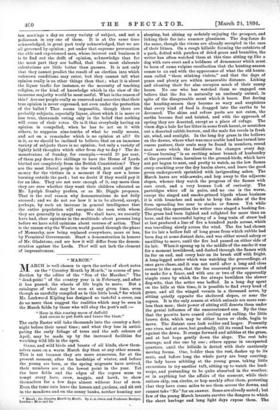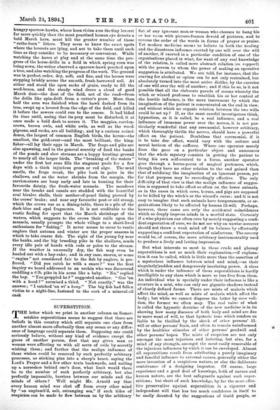" MARCH."
MARCH is well chosen to open the series of short notes on the " Country Month by Month," in course of pro- duction by the editor of the " Son of the Marshes." The " dead-point" of the country year is in February, and after it has passed, the wheels of life begin to move. But a catalogue of what may be seen at any given time, even though as carefully compiled as in this little book,* for which Mr. Lockwood Kipling has designed so tasteful a cover, can do no more than suggest the realities which may be seen in the March fields by those who will obey the poet's call:— "Here in this roaring moon of daffodil
And crocus to put forth and brave the blast."
The early Easter will take thousands into the country a fort- night before their usual time ; and what they lose in antici- pating the early foliage of trees and the soft colours of April, may be made up by the increased facilities for watching wild life in the open.
Game, and wild birds and beasts of all kinds, show them- selves more on a warm March day than at any other season. This is not because they are more numerous, for at the present moment, after the hardships of winter, and before the young are born, or the spring migrants have arrived, their numbers are at the lowest point in the year. Yet the bare fields and the edges of the copses seem to tempt every hare, crow, magpie, and hawk, to show themselves for a few days almost without fear of man. Even the tame eats leave the houses and gardens, and sit out in the meadows and on the sunny banks, neither hunting nor
• March : the Country Month by Month. By J. A. Owen and Professor Bonlger. London : Was and Co. sleeping, but sitting up sedately enjoying the prospect, and licking their fur into slimmer glossiness. The dog-foxes do the same, though the vixens are already occupied in the care of their litters. On a rough hillside forming the outskirts of a park, dotted with patches of dried grass and brambles, the writer has often watched them at this time sitting up like a dog with ears erect and a boldness of demeanour which must be born of some vulpine recollection that the hunting-season comes to an end with the appearance of what the old hunts- man called " them stinking violets," and that the days of peace and plenty are within measurable distance. Licking and cleaning their fur also occupies much of their sunny hours. No one who has watched them so engaged can believe that the fox is naturally an uncleanly animal, in spite of the disagreeable scent which it bears. But during the hunting-season they become so wary and suspicious that every kind of food is dragged into the earths to be devoured. The skins and refuse parts are not eaten, the earths become foul and tainted, and with the approach of spring they are deserted, except as a place of refuge. The vixen digs a hole for her litter in some fresh haunt, or scratches out a deserted rabbit-burrow, and the male fox revels in fresh air, wind, and sunlight. In the long dry grass in the hollows on the downs, where what was once amble land has turned into coarse pasture, their seats may be found in numbers, round neat nests which the fastidious fox changes every day. " Grass burning" is an exciting minor branch of husbandry at the present time, harmless to the ground-birds, which have not yet began to nest, and pretty to watch, as the low flames creep crackling over the dry haulm above, and leave the good green undergrowth sprinkled with invigorating ashes. The March hares are wide-awake, and hop away to the adjacent slopes, whence they watch the progress of the flames with ears erect, and a very human look of curiosity. The partridges whirr off in pairs, and no one is the worse, except the singed and smoke-grimed bipeds whose business it is with branches and sacks to keep the sides of the fire from spreading too near to stacks or fences. Yet while directing this operation the writer once singed a basking fox. The grass had been lighted and relighted for more than an hour, and the successful laying of a long train of straw had at last produced a line of fire a handred yards across, which was travelling slowly across the wind. The fox had chosen for its lair a hollow full of long grass from which rubble had been dug at some distant date, and was either sound asleep or unwilling to move, until the fire had passed on either side of its lair. When it sprang up in the middle of the smoke it was for a moment bewildered, and dashed through the flames with its fur on end, and every hair on its brush stiff with fright. A long-legged setter which was watching the proceedings, at once gave chase, and it was not until after a long and close course in the open, that the fox recovered presence of mind to make for a fence, and with one or two of the apparently simple ruses by which the fox always bewilders the slower dog-wits, that the setter was baffled. In a long day spent on the hills at this time, it is possible to find every head of game, and all the winged vermin in a thousand acres, by sitting quietly opposite the sheltered slopes, or near the copses. It is the only season at which animals are more rest- less than man ; their power of sitting still deserts them under the genial influence of the unaccustomed sun. By the time that the peewits have ceased circling and calling, the little brown dots, which may be either hares or clods, begin to move. The distant ones look redder and larger. Presently one rises, not at once, but gradually, till its round back shows against the down. It creeps forward and nibbles at the grass, and at last hops gently down the slope. The rest take courage, and rise one by one ; others appear in unexpected quarters, until the hillside is dotted with their cautiously moving forms. One, bolder than the rest, dashes up to its mate, and before long the whole party are busy courting, the lady hares nibbling at the young grass, taking little excursions to try another tuft, sitting up to watch the land- scape, and pretending to be quite absorbed in the weather, or in anything but the affairs of the moment, while their suitors skip, run circles, or hop meekly after them, protesting that they have come miles to see them across the downs, and cannot take "No" for an answer. Some are already mated; but few of the young March leverets survive the dangers to which the short herbage and long light days expose them. The hungry sparrow-hawks, whose keen vision sees the tiny leveret far more quickly than the most practised human eye detects a bold March hare, must kill the greater number of these "rathe-born " litters. They seem to know the exact spots where the leverets are lying, and not to take them until such time as they consider to be necessary or convenient. While watching the hares at play and at the same time the pro- gress of the horse-drills in a field in which spring corn was being sown, the writer observed a sparrow-hawk perched upon a tree, and also watching the progress of the work. The ground was in perfect order, dry, soft, and fine, and the horses were stepping briskly across the smooth, fresh•harrowed soil. At either end stood the open sacks of grain, ready to fill the seed-boxes, and the steady wind drove a cloud of good March dust—the dust of the field, not of the road—from the drills like spin-drift from a cutter's prow. More than half the area was finished when the hawk dashed from its tree, swept up a leveret from the edge of the field, and killed it before the sowers could run to the rescue. It had bided its time until, seeing that its prey must be disturbed, it at once made a bold dash to secure it. The magpies, carrion- crows, brown owls, and white owls, as well as the wood. pigeons, and rooks, are all building ; and by a carious coinci- dence, the largest of common English birds, the heron—the smallest, the gold-crest—and the most brilliant, the king- fisher—all lay their eggs in March. The frogs and pike are also spawning, and in the general scarcity of food the banks of the ponds and slow streams are a happy hunting- ground to nearly all the larger birds. The "breaking of the waters" under the first hot suns fills the stagnant pools for a few days with a thick injurious green or red algae. The mud smells, the frogs croak, the pike bask in pairs in the shallows, and as the water shrinks from the margin, the carrion-crows are busy early and late in hunting for their favourite dainty, the fresh-water mussels. The meadows near the brooks and canals are studded with the beautiful oval bivalve shells, their mother-of-pearl lining pierced by the crows' beaks ; and near any favourite post or old stump, which the crows use as a dining-table, there is a pile of the dark-blue and opal fragments. It is not creditable to the rustic feeling for sport that the March shrinkage of the waters, which suggests to the crows their raids upon the mussels, usually prompts the whole village to a short-lived enthusiasm for " fishing." It never seems to occur to rustic anglers that autumn and winter are the proper seasons in which to take coarse fish. The sight of the young fry near the banks, and the big breeding pike in the shallows, sends every idle pair of hands with rods or poles to the stream. If the weather is unusually dry, the fish may even be hauled out with a hay-rake; and in any case, snares, or some " engine" not considered fair to the fish by anglers, is pre- ferred. " Did you catch he with a snare ? was the first inquiry we heard addressed to an urchin who was discovered cuddling a 6 lb. pike in his arms like a baby. " No," replied the boy. " You groppled he ? " suggested another. " Got 'nn with a hood " surmised a third. " Not ezactly," was the answer; " I catched 'nn w? a bung." The big fish had fallen victim to a night-line, fastened to the cork of a mineral-oil cask



































 Previous page
Previous page